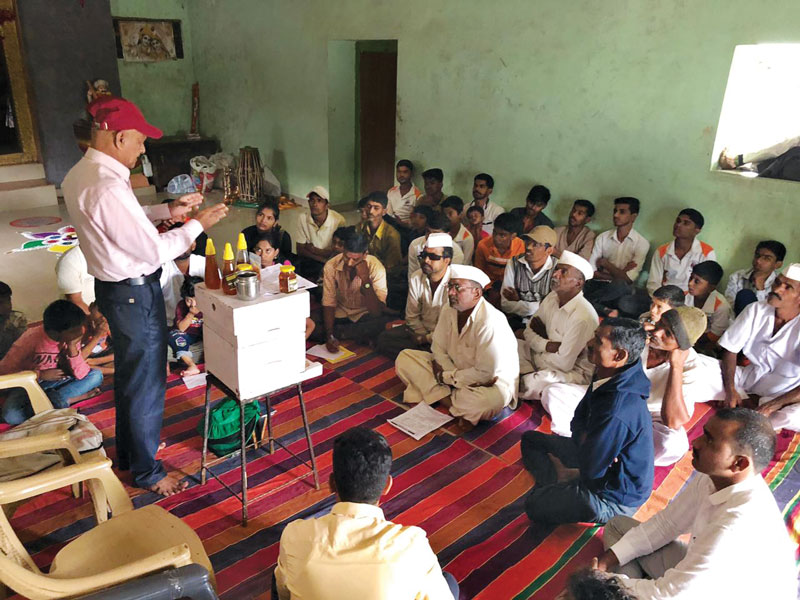Behind his thatched roof house at Maval, a small village to the east of Pune, Natha Maharaj Shelar, a rice farmer, tends to bees kept inside a wooden box. “Through this additional activity, my income will increase by ₹15,000 a year and I will be able to invest in a water pump,” he says. Four other farmers in the region are also now pursuing beekeeping or apiculture thanks to RC Pradhikaran, RID 3131, distributing bee harvesting boxes to them. “Our aim is to improve the environment in this village while involving, and improving living standards of the local community,” says Club President Bahar Shah. Each bee box contains 30,000 worker bees, 100 drones and a queen bee. The wooden box includes a bottom board, a hive body or two, several honey supers and an inner cover. An outer cover fits on top. The design and dimension of the artificial hive is based on the concept of bee space and comes at the cost of ₹5,000.

Vijay Mahajan, Founder of the Shivsagar Madh Udyog that manufactures organic raw honey in Pune, trains these farmers in beekeeping and also buys back their raw honey and processes it for sale in the retail market. “Each farmer can earn around ₹150 for one kg of honey. In one season the earning can go up to ₹4,000 per box. The current demand for organic honey in India alone is 20 lakh tonnes. Our Udyog is willing to buy honey from these families at a predetermined price,” he says.

Apart from honey, the bee wax can be sold to pharmaceutical companies at ₹300 per kg. It will take approximately a year for these farmers to scale up and they can decide to buy more bee-harvesting boxes depending on the money they make.
Mahajan, who is currently training 10,000 farmers on beekeeping in Arunachal Pradesh, explains that beekeeping alone won’t provide enough income for farmers to make a living. But bee pollination will increase the crop yield for farmers. “Beekeeping brings additional income and the farmers have understood that honeybees play a large role in maintaining the biodiversity of plant ecosystems. Plants depend on bees and other insects as pollinators. This can improve crop yield by 20 per cent annually,” he adds.
Bahar adds that currently under the Khadi Gram Udyog scheme the government helps farmers with loans to generate additional income by investing in different kinds of farming. “We wanted to give farmers a foundation before they approached the banks for loans. This programme focuses on the livelihood of farmers, conservation of environment, development of organic market, and training and information sharing with farmers. We intend to include more farmers in this initiative.”
Back at his house Maharaj Shelar says, “I grow on my farm rice, tomatoes, groundnut and brinjal. I work hard in the field and to come home to the buzzing of the bees is a delight. I don’t have to do much and it is exciting to know that I will reap a sweet benefit from this venture.”





